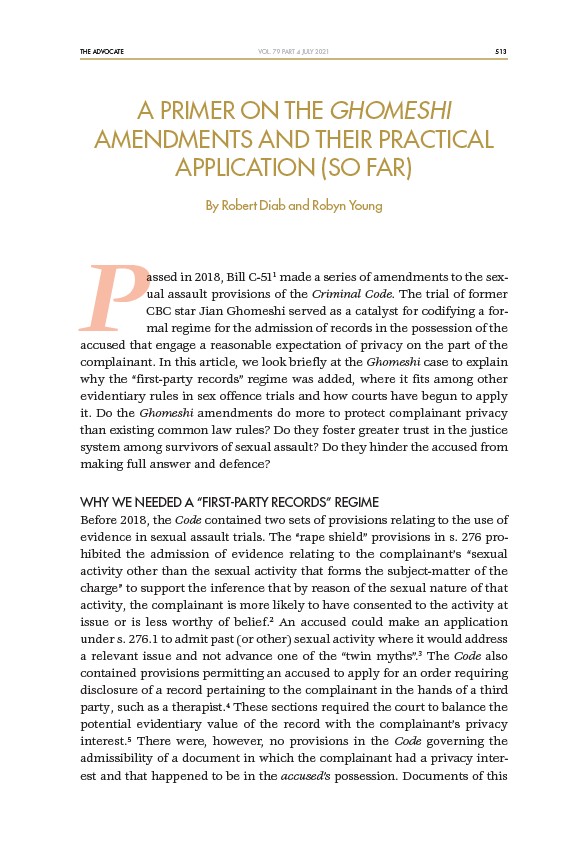
THE ADVOCATE 513
VOL. 79 PART 4 JULY 2021
A PRIMER ON THE GHOMESHI
AMENDMENTS AND THEIR PRACTICAL
APPLICATION (SO FAR)
By Robert Diab and Robyn Young
Passed in 2018, Bill C-511 made a series of amendments to the sexual
assault provisions of the Criminal Code. The trial of former
CBC star Jian Ghomeshi served as a catalyst for codifying a formal
regime for the admission of records in the possession of the
accused that engage a reasonable expectation of privacy on the part of the
complainant. In this article, we look briefly at the Ghomeshi case to explain
why the “first-party records” regime was added, where it fits among other
evidentiary rules in sex offence trials and how courts have begun to apply
it. Do the Ghomeshi amendments do more to protect complainant privacy
than existing common law rules? Do they foster greater trust in the justice
system among survivors of sexual assault? Do they hinder the accused from
making full answer and defence?
WHY WE NEEDED A “FIRST-PARTY RECORDS” REGIME
Before 2018, the Code contained two sets of provisions relating to the use of
evidence in sexual assault trials. The “rape shield” provisions in s. 276 prohibited
the admission of evidence relating to the complainant’s “sexual
activity other than the sexual activity that forms the subject-matter of the
charge” to support the inference that by reason of the sexual nature of that
activity, the complainant is more likely to have consented to the activity at
issue or is less worthy of belief.2 An accused could make an application
under s. 276.1 to admit past (or other) sexual activity where it would address
a relevant issue and not advance one of the “twin myths”.3 The Code also
contained provisions permitting an accused to apply for an order requiring
disclosure of a record pertaining to the complainant in the hands of a third
party, such as a therapist.4 These sections required the court to balance the
potential evidentiary value of the record with the complainant’s privacy
interest.5 There were, however, no provisions in the Code governing the
admissibility of a document in which the complainant had a privacy interest
and that happened to be in the accused’s possession. Documents of this